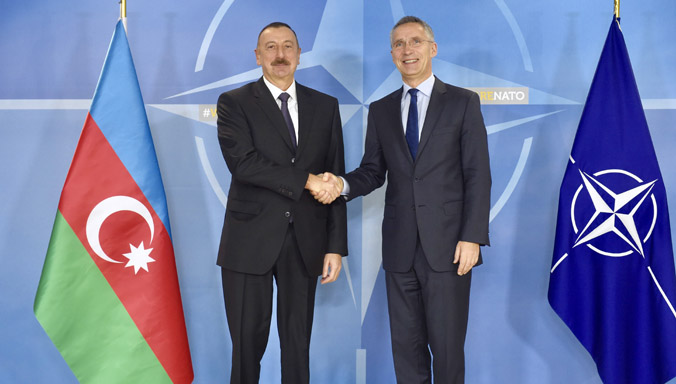The defense minister of Azerbaijan, Zakir Hasanov, recently met with the new Italian ambassador to his nation, Claudio Taffuri, and among other topics the two discussed what the Azerbaijani Defense Ministry described as “the latest tension on the Azerbaijani-Armenian state border, including the liberated territories and bilateral military cooperation.”
If you’re asking yourself why the new Italian envoy is immediately consulting with his host nation’s defense chief on the aftermath of last year’s war against Nagorno-Karabakh and increasing military ties with the aggressor you’re not the only one. Hasanov, News.az reported, especially stressed expanding bilateral military cooperation between his country and Italy. The Italian ambassador reciprocated by confirming that his nation will “make every effort for the development of the Azerbaijani-Italian relationship, in particular for cooperation in the military sphere.”
The two agreed on increasing military collaboration between the armies of the two states “within the framework of NATO programs,” and cooperation on regional security issues.
The Azerbaijani defense chief also recently met with the Afghan ambassador to Baku, Amanullah Jayhoon, during which colloquy the defense minister spoke of the role of Azerbaijani troops in the current NATO operation in Afghanistan, Resolute Support, successor to the International Security Assistance Force, for which Azerbaijan also supplied troops.
In late June Defense Minister Hasanov met with the chief of staff of NATO’s Allied Land Command, Metin Tokel, who praised Azerbaijan as a reliable partner of the 30-nation military bloc. (Allied Land Command was established in Izmir, Turkey in 2012. Turkey has trained the military of its “one nation, two states” ally to meet NATO standards. The Azerbaijani armed forces are NATO interoperable.)

An account of the meeting stated that Raimonds Bergmanis, a Latvian member of the NATO Parliamentary Assembly Security and Defence Commission, had recently praised Azerbaijan for its role in NATO’s war in Afghanistan over almost twenty years and said that “NATO is grateful to it for that.”
The Latvian MP spoke at the conference Azerbaijan’s Contribution to the Euro-Atlantic Peace and Security in the capital of Azerbaijan on June 16 during which he lavished the above praise on NATO’s main partner on the Caspian Sea. At the same event Azerbaijani presidential aide Hikmat Hajiyev said his nation, as paraphrased by the Azerbaijani press, “welcomes NATO’s active role in ensuring and maintaining international peace and security.” He added on behalf of the president that Azerbaijan is “committed to the fundamental principles of partnership within the existing agreements” with NATO.
The foreign policy adviser to President Ilham Aliyev added: “We want further expansion of political dialogue and cooperation with NATO. We highly appreciate durable dialogue with NATO countries. I visited NATO headquarters recently, we had interesting, important discussions, we informed [NATO of] the situation after the conflict in the South Caucasus.” NATO officials were briefed on last year’s war of aggression against Nagorno-Karabakh and its results.
The local press also cited Svante Cornell, founder and director of the Swedish-based Institute for Security and Development Policy, stating that the Azerbaijani-NATO partnership is more vital than ever before. He was quoted affirming: “Azerbaijan is one of the most important countries in the region. Azerbaijan’s geographic location is very important and strategic. It makes the country one of the most important countries in the region.” about:blank Report this ad
Azerbaijan is indeed important and strategically crucial to NATO’s “drive to the south and the east” as a State Department official identified it years ago. As important as if not more strategically decisive than any other nation in the world.


